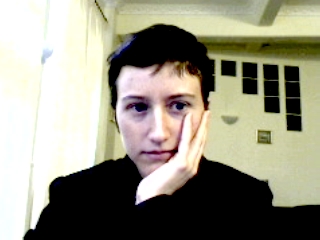Our first stop was the Quarry Arts Centre on the outskirts of town. This turned out to be a pleasantly rambling chaos of artist studios and sculpture, every nook and cranny - down the niches in the brick walls - filled with art.
Mom under lanterns, Dad in the background
Me in front of one of the artist studios
Weird and wonderful sculpture pond/fountain
After a leisurely walk through the grounds, Mom and I followed some vague signs pointing the way to a pa site. Our trusty guidebook told us that a pa site was some kind of ancient Maori military encampment or fortification - we'd been seeing signs for them here and there and decided to find out what all the fuss was about. The trail lead us on a pleasant hike up the wooded hills that rise up directly behind the artist village. I was expecting the ruins of some kind of fort, maybe some crumbling rock walls - but when we got there it was just a flat piece of land with a good view overlooking Whangarei.
Next we headed to an area along the river where we strolled along the waterfront, checking out the boats on one side and the many art galleries and other shops along the other side. Our destination was Clapham's Clocks (aka The National Clock Museum). This turned out to be one large room crammed full of every type of clock imaginable. We got in half way through a tour of the museum: a docent going around the room discussing some of the highlights of the collection, making the cuckoos do their stuff, and so on. Not two clocks were in synch with each other; chimes and tinkling tunes and pirouetting miniatures were going off at random intervals. Not to mention the constant sound of thousands of clocks ticking. There were grandfather clocks and cuckoo clocks and the ticking machinery of clock towers. There were hour glasses and slick digital clocks circa 1980, and everything in between. It was more impressive than I would have thought a room full of clocks could be.
The day was winding down and it was time to hit the grocery store to restock our supplies and hit the road. We were headed back south so we could hit Auckland by Sunday evening to pick up Loren. We ended up in a holiday park that sat cozily adjacent to a tourist attraction called Sheep World. There was a paddock of bright pink sheep out by the entrance. It was raining in earnest by the time we pulled up to the reception area. Dad and I got out and knocked, rang the door bell, and attempted to use the courtesy phone all to no avail (some of the buttons seemed to have stopped working). We were starting to wonder if the place was even open when a guy about my dad's age came trundling across the park in the rain, wearing shorts and gumboots and carrying a battered umbrella, his dog in toe. He greeted us kindly and explained he had been off tending to his sheep. He got us sorted out for the night, all the while he and dad grumbling congenially to each other about politics, the weather, and the evils of modern technology.
The place was nice if a bit rustic; you could see how the open-air kitchen looking out onto a little pond complete with tiny waterfall would be lovely on a warm summer day. The caretaker mentioned glow worms down by the waterfall, but the rain was really getting going and night was falling. After settling into what turned out to be our best camping site yet (we got our own personal bathroom literally a couple steps from the sliding door of our campervan) we holed up in our camper, cooked our backup stash of pasta-and-sauce for dinner with salad on the side, took luxurious unhurried hot showers, and pretty much called it a night.
Our camp site at Sheepworld Campervan Park
Dad and I investigate the kitchen
The aforementioned pond and tiny waterfall

